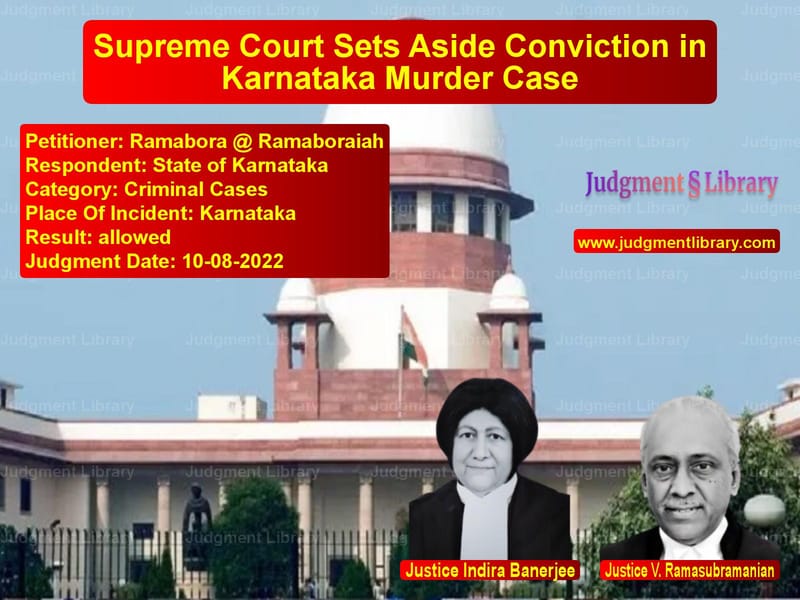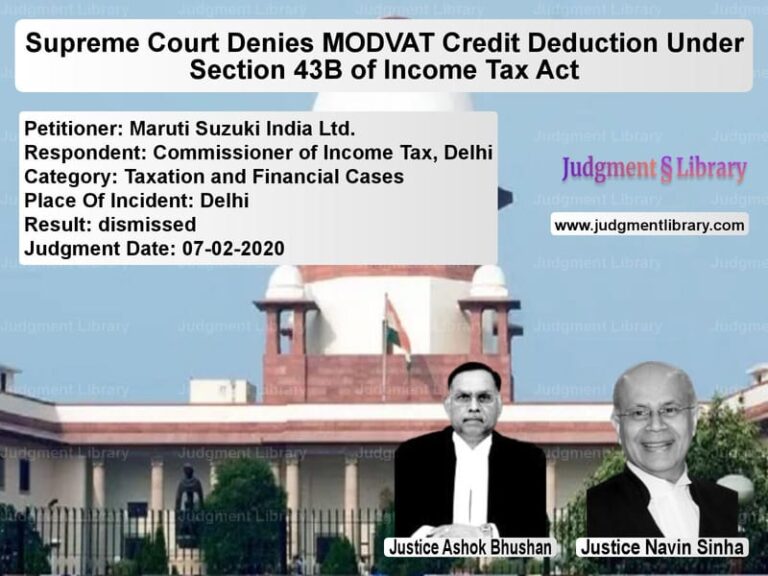Supreme Court Sets Aside Conviction in Karnataka Murder Case
The case of Ramabora @ Ramaboraiah & Anr. v. State of Karnataka revolves around the conviction of two appellants for the murder of a man named Siddaraju. The appellants were originally acquitted by the trial court, but the Karnataka High Court reversed this decision, convicting them under Section 302 of the Indian Penal Code (IPC) for murder. The Supreme Court, upon reviewing the case, set aside the High Court’s conviction and acquitted the appellants. The ruling sheds light on the standards of evidence required to uphold a conviction in criminal cases, and the Court’s approach to considering discrepancies and contradictions in eyewitness testimonies.
Background of the Case
The incident in question took place on November 30, 1997, when the two appellants, along with 20 others, allegedly formed an unlawful assembly and committed the murder of Siddaraju. The prosecution’s case was that the appellants, along with their associates, entered Siddaraju’s house, dragged him out, and killed him in the street with deadly weapons such as an axe and sickle.
The key witness, PW-1, the mother of the deceased, provided an account of the attack, but the evidence presented by the prosecution was inconsistent and conflicting. While the trial court acquitted the appellants, citing contradictions in the testimonies, the High Court overturned this decision, convicting the appellants. The appellants then filed an appeal before the Supreme Court, which ultimately led to the reversal of the conviction.
Petitioner’s Arguments
The appellants, represented by their counsel, argued that:
- The testimonies of the key witnesses, PW-1 and PW-4, contained significant contradictions and inconsistencies, which cast doubt on the credibility of the case against them.
- The trial court’s acquittal was based on a detailed analysis of the evidence, which demonstrated the improbability of the appellants’ involvement in the crime.
- The High Court had erred in convicting them despite the absence of solid evidence, especially considering the conflicting versions provided by the eyewitnesses regarding the weapons used in the crime.
- The High Court failed to properly address the inconsistencies in the testimonies and had unjustly relied on the exaggerated claims of the prosecution’s witnesses.
Respondent’s Arguments
The State, represented by its counsel, argued that:
- The testimonies of the eyewitnesses, particularly PW-1 and PW-4, were consistent regarding the appellants’ involvement in the crime.
- The High Court rightly found the appellants guilty based on the evidence presented, including the direct involvement of the appellants in the murder, as testified by the witnesses.
- The discrepancies in the testimonies were minor and did not affect the overall reliability of the witnesses or the prosecution’s case.
- The appellants’ conviction was justified by the facts, and the evidence sufficiently supported the charges of murder.
Supreme Court’s Key Observations
The Supreme Court made several important observations in this case:
- Discrepancies in Eyewitness Testimonies: The Court highlighted the discrepancies in the testimonies of the key witnesses, PW-1 and PW-4. It noted that while they provided consistent accounts regarding the appellants’ involvement, there were significant contradictions regarding the weapons used in the attack and the specific actions of the appellants. The Court observed that these inconsistencies cast serious doubt on the reliability of the prosecution’s case.
- The Role of Eyewitnesses: The Court acknowledged the importance of eyewitness testimonies but stressed the need for them to be consistent and reliable. In this case, the conflicting versions provided by the eyewitnesses weakened the case against the appellants.
- Principle of Benefit of the Doubt: The Court reiterated the principle that if there are serious doubts regarding the prosecution’s case, the benefit of the doubt must be given to the accused. Given the inconsistencies in the evidence, the Court found that the appellants were entitled to the benefit of the doubt.
- Judicial Approach to Contradictions: The Court cited previous cases where the presence of glaring contradictions in the prosecution’s evidence led to acquittals. It emphasized that such contradictions could not be ignored, especially in a case as serious as murder.
Supreme Court’s Judgment
The Supreme Court ruled in favor of the appellants, setting aside the conviction imposed by the High Court. The Court held that the inconsistencies in the testimonies of the witnesses and the lack of corroborative evidence rendered the case against the appellants doubtful. As a result, the appellants were acquitted, and the conviction under Section 302 IPC was overturned.
Impact of the Judgment
This judgment has significant implications for the criminal justice system, particularly in cases involving serious charges like murder:
- Importance of Consistent and Reliable Evidence: The ruling underscores the importance of consistent and reliable eyewitness testimonies in criminal cases. If witnesses provide conflicting versions of events, the case may not meet the threshold for conviction.
- Benefit of the Doubt: The judgment reinforces the principle that if there are serious doubts regarding the prosecution’s case, the benefit of the doubt must be given to the accused.
- Judicial Scrutiny of Eyewitness Testimonies: The case highlights the need for courts to carefully scrutinize the testimonies of eyewitnesses, particularly in cases with serious consequences like murder, and to reject unreliable or contradictory evidence.
- Standards for Conviction in Criminal Cases: The judgment sets a precedent for future cases involving contradictions in the evidence. It makes clear that a conviction based on unreliable or contradictory evidence cannot stand.
Conclusion
The Supreme Court’s judgment in Ramabora @ Ramaboraiah v. State of Karnataka highlights the critical importance of consistent and credible evidence in criminal trials. By setting aside the High Court’s conviction and acquitting the appellants, the Court reaffirmed the principle that the prosecution must prove its case beyond a reasonable doubt. The decision serves as an important reminder that in criminal justice, fairness must always prevail, and any doubt about the accused’s involvement must benefit the accused.
Read also: https://judgmentlibrary.com/supreme-court-quashes-case-against-kerala-nuns-under-section-228a-ipc/
Petitioner Name: Ramabora @ Ramaboraiah.Respondent Name: State of Karnataka.Judgment By: Justice Indira Banerjee, Justice V. Ramasubramanian.Place Of Incident: Karnataka.Judgment Date: 10-08-2022.
Don’t miss out on the full details! Download the complete judgment in PDF format below and gain valuable insights instantly!
Download Judgment: ramabora-@-ramaborai-vs-state-of-karnataka-supreme-court-of-india-judgment-dated-10-08-2022.pdf
Directly Download Judgment: Directly download this Judgment
See all petitions in Murder Cases
See all petitions in Bail and Anticipatory Bail
See all petitions in Judicial Review
See all petitions in Judgment by Indira Banerjee
See all petitions in Judgment by V. Ramasubramanian
See all petitions in allowed
See all petitions in supreme court of India judgments August 2022
See all petitions in 2022 judgments
See all posts in Criminal Cases Category
See all allowed petitions in Criminal Cases Category
See all Dismissed petitions in Criminal Cases Category
See all partially allowed petitions in Criminal Cases Category







